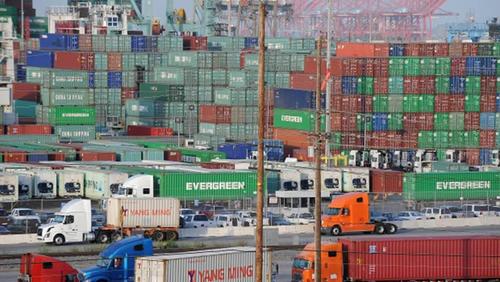Port Slowdown Costing Manufacturers Millions
Roughly seven months into the Los Angeles and Long Beach ports slowdown with, unfortunately, no end in sight, and manufacturers in just about every industry, from electronics to home goods, are feeling the pain.
Case in point: furniture manufacturer AICO. One week prior to trade show in Las Vegas, and more than three-quarters of the company's furniture samples remain on boats in the harbor waiting to dock and unload.
While unions and terminal operators go back and forth on contract negotiations and possible solutions to the slowdown, manufacturers are caught in the middle losing millions of dollars, because they're not able to meet their customers' demand.
Michael Amini, president and CEO of AICO, a 200-employee furniture manufacturer, relies on a captive manufacturer in China from which it serves more than 3,000 clients in about 80 countries. The company also relies on a transportation supply chain of steamship lines, trucking companies and trains to get products to market. Some 95% of its products come from overseas. The fine-tuned logistics process means getting shipments on time, weekly. Early shipments clog the warehouse, and late shipments make the supply chain too unpredictable.
"The issues at the ports continue to drag on, and it has truly disrupted business," Amini said. "We have lost millions and millions of dollars in business. Our furniture business relies on attending trade shows and showing the merchandise. On average we spend between $3 million to $4 million per show."
Amini said the company didn't receive its samples for the past two shows held in August and October, due to the port situation. Customers come to the shows to look at the new merchandise and place orders for retail. Without these samples, the company loses business. Inventory has been sitting on cargo ships for weeks with no estimated scheduled time to dock.
AICO's issues are not unusual these days. Companies from furniture to perishable products to electronic component manufacturers continue to experience the same pain. Amini also ships wood from the U.S. to China to manufacturer its furniture, and they can't get the containers to ship the materials overseas. "That affects American jobs, products, and economy," he said. "We're still receiving containers, but the process is very slow and untimely."
There are few workaround options, Amini said. Any resolution will cost much more and eat into bottom line profits. AICO can ship a container to Seattle or the east coast and truck it down to the southern states for an extra $7,000, and add another two weeks delivery time. Rather than paying $2,500 to move the cargo by ship into Los Angeles or Long Beach, it will cost $4,500 to divert the delivery to another port. The slowdown not only creates a financial burden, but erodes old, established relationship between the manufacturer and its resellers.
Shipments, on average, will rise nationwide during the first six month in 2015, per a recent study. The monthly Global Port Tracker report released by the National Retail Federation (NRF), and Hackett Associates, show aggregate numbers for ports across the United States. January is forecast to rise 1.1 percent to 1.39 million twenty four equivalent unit (TEU) shipping container, compared with the year-ago month; February will rise 4.8 percent to 1.3 million TEU; March will fall 0.5 percent to 1.3 million TEU; April remains stagnant at 1.43 million TEU; and May will rise 0.6 percent to 1.49 million TEU, respectively.
Lee Peterson, a spokesman for the Port of Long Beach, acknowledges the serious problem causing the slowdown at the Port of Los Angeles and the Port of Long Beach. The official word blames a truck chassis shortage. The shortage creates a slowdown that keeps an average of seven or eight ships at any one time in the harbor waiting to unload. "We are working very hard to find a way to relieve the congestion by providing additional chassis though different means," he said. "We're in the process of getting special permission from the federal government to collaborate on congestion relief issues."
Peterson sees a light at the end of the tunnel, but admits the plan will take time to work through. There's a long term plan in place, as well, to make sure it doesn't happen again. He knows that if companies lost business they might find other means of getting product into the hands of customers. That might mean shipping the products to another port.
A truck-trailer chassis shortage initially caused the delays in unloading and reloading shipments from the Long Beach and Los Angeles ports, Peterson said. More cargo came through the Port of Long Beach in 2014, compared with recent previous years. Congestion continued to build and everyone got further behind. "Unfortunately, it's the kind of problem that builds on itself, and until we get it sorted out, we can't get back to the free-flowing way," Peterson said.
Aside from operational issues, the lack of a contract led to the congestion. Reports suggest the contract between the Pacific Maritime Association and the International Longshore and Warehouse Union expired on July 1, 2014. At this point, AICO's Amini just hopes for the best.
Case in point: furniture manufacturer AICO. One week prior to trade show in Las Vegas, and more than three-quarters of the company's furniture samples remain on boats in the harbor waiting to dock and unload.
While unions and terminal operators go back and forth on contract negotiations and possible solutions to the slowdown, manufacturers are caught in the middle losing millions of dollars, because they're not able to meet their customers' demand.
Michael Amini, president and CEO of AICO, a 200-employee furniture manufacturer, relies on a captive manufacturer in China from which it serves more than 3,000 clients in about 80 countries. The company also relies on a transportation supply chain of steamship lines, trucking companies and trains to get products to market. Some 95% of its products come from overseas. The fine-tuned logistics process means getting shipments on time, weekly. Early shipments clog the warehouse, and late shipments make the supply chain too unpredictable.
"The issues at the ports continue to drag on, and it has truly disrupted business," Amini said. "We have lost millions and millions of dollars in business. Our furniture business relies on attending trade shows and showing the merchandise. On average we spend between $3 million to $4 million per show."
Amini said the company didn't receive its samples for the past two shows held in August and October, due to the port situation. Customers come to the shows to look at the new merchandise and place orders for retail. Without these samples, the company loses business. Inventory has been sitting on cargo ships for weeks with no estimated scheduled time to dock.
AICO's issues are not unusual these days. Companies from furniture to perishable products to electronic component manufacturers continue to experience the same pain. Amini also ships wood from the U.S. to China to manufacturer its furniture, and they can't get the containers to ship the materials overseas. "That affects American jobs, products, and economy," he said. "We're still receiving containers, but the process is very slow and untimely."
There are few workaround options, Amini said. Any resolution will cost much more and eat into bottom line profits. AICO can ship a container to Seattle or the east coast and truck it down to the southern states for an extra $7,000, and add another two weeks delivery time. Rather than paying $2,500 to move the cargo by ship into Los Angeles or Long Beach, it will cost $4,500 to divert the delivery to another port. The slowdown not only creates a financial burden, but erodes old, established relationship between the manufacturer and its resellers.
Shipments, on average, will rise nationwide during the first six month in 2015, per a recent study. The monthly Global Port Tracker report released by the National Retail Federation (NRF), and Hackett Associates, show aggregate numbers for ports across the United States. January is forecast to rise 1.1 percent to 1.39 million twenty four equivalent unit (TEU) shipping container, compared with the year-ago month; February will rise 4.8 percent to 1.3 million TEU; March will fall 0.5 percent to 1.3 million TEU; April remains stagnant at 1.43 million TEU; and May will rise 0.6 percent to 1.49 million TEU, respectively.
Lee Peterson, a spokesman for the Port of Long Beach, acknowledges the serious problem causing the slowdown at the Port of Los Angeles and the Port of Long Beach. The official word blames a truck chassis shortage. The shortage creates a slowdown that keeps an average of seven or eight ships at any one time in the harbor waiting to unload. "We are working very hard to find a way to relieve the congestion by providing additional chassis though different means," he said. "We're in the process of getting special permission from the federal government to collaborate on congestion relief issues."
Peterson sees a light at the end of the tunnel, but admits the plan will take time to work through. There's a long term plan in place, as well, to make sure it doesn't happen again. He knows that if companies lost business they might find other means of getting product into the hands of customers. That might mean shipping the products to another port.
A truck-trailer chassis shortage initially caused the delays in unloading and reloading shipments from the Long Beach and Los Angeles ports, Peterson said. More cargo came through the Port of Long Beach in 2014, compared with recent previous years. Congestion continued to build and everyone got further behind. "Unfortunately, it's the kind of problem that builds on itself, and until we get it sorted out, we can't get back to the free-flowing way," Peterson said.
Aside from operational issues, the lack of a contract led to the congestion. Reports suggest the contract between the Pacific Maritime Association and the International Longshore and Warehouse Union expired on July 1, 2014. At this point, AICO's Amini just hopes for the best.


No comments:
Post a Comment